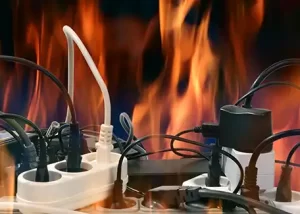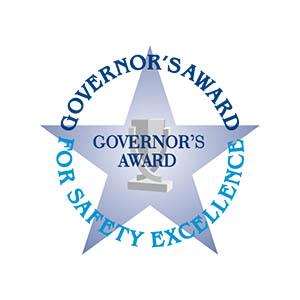By Ashley Loos, Health & Safety Consultant
In today’s modern work environments, electricity powers the majority of our daily operations. From lighting and equipment to complex machinery, electrical systems are integral to productivity and efficiency. However, this dependence on electricity also brings inherent risks.
Understanding Electrical Hazards in the Workplace
Electricity, while essential, can pose numerous dangers if not properly managed. Stay vigilant at your workplace to avoid common electrical hazards such as:
 » Electric shocks – Contact with live electrical components can cause severe – sometimes even fatal – shocks that result in burns, muscle contractions, or cardiac arrest.
» Electric shocks – Contact with live electrical components can cause severe – sometimes even fatal – shocks that result in burns, muscle contractions, or cardiac arrest.
» Arc flashes and explosions – Electrical faults or improper equipment handling can lead to intense releases of energy that cause severe burns, hearing damage, and eye injuries.
 » Fires – Faulty electrical installations, overloaded circuits, or the improper use of electrical equipment can spark fires, endangering both employees and the workplace.
» Fires – Faulty electrical installations, overloaded circuits, or the improper use of electrical equipment can spark fires, endangering both employees and the workplace.
» Electrocution – Inadequate grounding, damaged insulation, or bare live wires can expose individuals to the risk of electrocution, which can be life-threatening.
» Slips, trips, and falls – Poorly maintained electrical cords, improperly placed cables, or tangled wires are hazardous conditions that can cause a slip, trip, or fall, as well as additional injuries.
Promoting Electrical Safety in the Workplace
To maintain efficient operations and ensure employee well-being, it is crucial to raise awareness about electrical safety and implement preventative measures. Reduce the likelihood of accidents and create a secure working environment by applying robust electrical safety practices like the ones below.
 » Conduct regular risk/hazard assessments. Identify potential electrical hazards in the workplace and assess the associated risks. Inspect electrical systems, equipment, and cords to ensure compliance with safety standards. It is imperative to remove from service any damaged or defective equipment.
» Conduct regular risk/hazard assessments. Identify potential electrical hazards in the workplace and assess the associated risks. Inspect electrical systems, equipment, and cords to ensure compliance with safety standards. It is imperative to remove from service any damaged or defective equipment.
» Establish a comprehensive safety program. Develop and implement an electrical safety program that encompasses policies, procedures, best practices, and training for employees. Emphasize the importance of safe work practices and make safety a top priority.
» Maintain adequate wiring and grounding. Regularly inspect and maintain wiring systems to prevent electrical malfunctions. Ensure proper grounding of electrical equipment to minimize the risk of electric shocks.
 » Implement lock-out/tag-out procedures. Establish lock-out/tag-out procedures to isolate energy sources during maintenance or repair work. This prevents accidental energization of equipment and safeguards workers from electrical hazards.
» Implement lock-out/tag-out procedures. Establish lock-out/tag-out procedures to isolate energy sources during maintenance or repair work. This prevents accidental energization of equipment and safeguards workers from electrical hazards.
» Provide personal protective equipment (PPE). Supply appropriate PPE, such as insulated gloves, safety glasses, and flame-resistant clothing, to employees working in proximity to electrical systems.
» Encourage reporting and incident investigation. Promote a culture of reporting near misses and incidents related to electrical safety. Conduct thorough investigations to identify root causes and implement corrective actions to prevent a recurrence.
» Regularly inspect and maintain equipment. Schedule routine inspections, testing, and maintenance of electrical equipment to identify and rectify potential issues promptly. Ensure only qualified personnel handle repairs and installations.
» Educate employees. Conduct regular training sessions to educate employees about electrical safety protocols, proper equipment usage, and emergency procedures. Encourage open communication and empower employees to report any concerns promptly.
Electrical safety is a responsibility, shared by the organization and its employees, requiring proactive measures, continuous training, and regular equipment maintenance. All employees are instrumental in fostering a culture of safety, ensuring compliance with regulations, and mitigating electrical hazards.
Does your company need specialized safety training? RETTEW offers a variety of courses and services, like construction safety oversight and high-risk work program consultation, to ensure you and your staff are prepared. Contact us to learn more about RETTEW’s comprehensive and compliant safety training programs and consultations.
Additional Offerings
Safety training and consulting are only some of RETTEW’s 600-plus services. Our safety team works hand in hand with engineers, scientists, project managers, and other technical experts at places such as manufacturing facilities, drill pads, and commercial construction sites. We are well respected for our work in a diverse number of industries and are known for ensuring workers and equipment remain safe, which keeps your projects on track and your bottom line growing.
